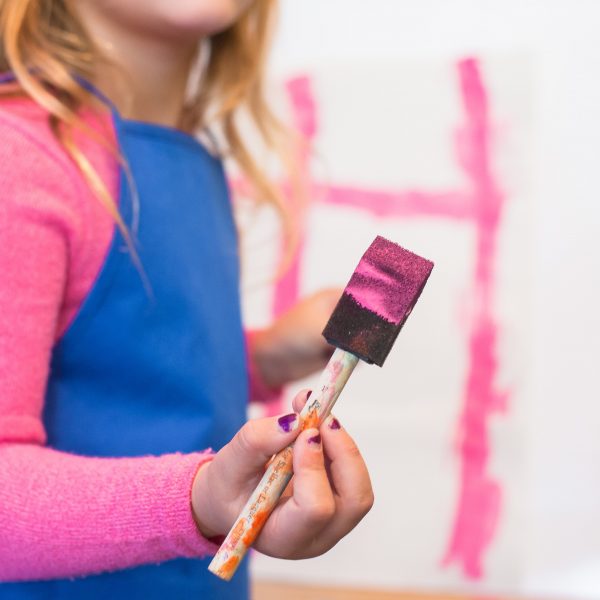Innovative solutions cap lifted: Service shares its journey to success using the funding

While many in the early childhood education and care (ECEC) sector welcomed a recent announcement by the Department of Education indicating that the cap on Innovative Solutions Support projects had been lifted, there is still some lack of clarity about what types of projects the fund supports, and how funding can be utilised.
Innovative Solutions Support funds flexible and responsive solutions to inclusion barriers. It is part of the Inclusion Support Program (ISP), which helps services care for children with additional needs.
A temporary cap of $10,000 was placed on Innovative Solutions projects between 14 September 2021 and 30 June 2022, which has now been lifted.
Eligible services can apply for Innovative Solutions projects without a specified limit, and can apply for funding at any time. Applications over $10,000 are referred to the department by the Inclusion Development Fund Manager (IDFM) for approval.
To learn more about how one service used its Innovative Solutions funding we spoke to Jacqui Bursztynowicz, Director of Water Street Childcare and Kindergarten in Cairns, Queensland.
Emotional outbursts, thrown furniture
Jacqui and her team were seeking solutions to a number of challenging issues which included children having “emotional outbursts” and throwing toys and furniture in such a way that educators and other children were being physically harmed.
Children would run from the room when these outbursts happened to remain safe. Coupled with this, some of the educators were concerned about school readiness, and what this looked like, worried that the children in their care were not “school ready.”
“As the Nominated Supervisor of the service, I had a vision and thoughts of what we could do but sometimes, as a leader, you doubt yourself,” Jacqui shared.
“Water Street has been established for over thirty years, with decades of practices embedded throughout this history. It was started as an Occasional Care Service, and we transitioned in scope to a Long Day Care three years ago. We have been blessed with a team of long-term educators, many of whom have only ever worked at Water Street.”
As such, transitioning through different models has been “a steep learning curve” for the team, some of whom have been scared of change, having done things a certain way for such a long time.
Seeking support
“We had been through our first assessment and rating visit as a long day care service,” Jacqui explained, “and we were told that we were not meeting element 5.2.2, around self regulation.”
“We had always prided ourselves and our reputation on our relationships with children, so we were surprised by this. Although educators had great relationships and interactions with children, I guess we struggled when dealing with emotional outbursts, or following through and modelling the tools to teach the children how to self-regulate.”
One of the children attending the service at the time had experienced trauma, and was living in a foster care home.
“Understandably, this child exhibited behaviours that were challenging for our educators,” Jacqui continued.
Despite the collective 160 years of experience within the team, and the long standing skillset they held, the experience of catering to the specific needs of this child “tested even the most experienced.”
Given the challenges they were faced with, the team reached out to their local Inclusion Support Specialist, who then supported them to develop a project funded with Innovative Solutions Funding.
“After researching providers and what they had to offer we decided that Phoenix Support for Educators were going to be the best fit for our service,” Jacqui said.
“Having the support from another professional who had the knowledge to explain things further to the educators about why children were displaying the behaviours was the missing link that we needed to progress. I went from feeling unsure to “I’ve got this. We’ve got this, team”.
Reconsidering routines and practices
When Jacqui and her team looked at the practices in the space which were triggering the challenging behaviours, they noticed that compulsory group times, structured room routines, meal times that were “clock driven” and sleep and rest times where all the children were transitioned at the same time were pain points in the day.
“To move forward, we needed to create a culture where change was not something to be feared and can be positive,” Jacqui said.
A series of professional development workshops with the educator team, along with a series of resources, and recommendations for the QIP supported educators on their journey, which also included self paced online training.
A brighter future
With support, the team created a series of changes which had “incredible impacts on children’s behavioural, social, and emotional learning.”
As a result of their journey to change, the team has now implemented the following curriculum decisions / program changes:
-
Implement a free flow program
-
Ditched room routines and instead now have a daily flow/rhythm
-
Offer progressive mealtimes
-
Group times by invitation, allowing some children to stay involved in their play, while others are invited to learn together with an educator
-
Cup filling plans (using the Phoenix Cups™ framework) for the environment now replace behaviour management plans
-
Educators changed their language to connect with children as a priority, rather than correcting or directing
-
Connection plans for educators to work on to increase positive interactions with children
“We eased off on expectations for the Kindy children being ready for school, and focused more on their wellbeing now, leading up to supporting their transition to school,” Jacqui added.
More natural and open-ended resources have been added to the environment, a deeper exploration of loose parts theory and resources has taken place, and schematic play has been used by the team as a lens for observations.
“We started excursions again engaging with the community and accessing open green spaces, natural spaces, and built spaces throughout Cairns,” Jacqui shared.
“We soon noticed that with the changes we had implemented that educators were more relaxed and were enjoying meal times and group times more. The connections between educators and children improved. Our daily blasts and documentation improved with more use of language and explanations.”
Most importantly, however, since undertaking their change journey, there are fewer emotional outbursts from the children, who now have more language to support them to express how they are feeling, and greater skills to self-regulate.
Classrooms feel more calm, with children responding positively to being allowed to continue to play when in flow, eat when they are hungry, and rest when they are tired.
The biggest lessons
When looking back through the journey to get to this point, the team identified many “ah hah!” moments, including:
-
Children are connection seeking, not attention seeking
-
Connection needs to come before correction
-
Educators can’t pour from an empty cup
-
“Say what you see, ask a question” when supporting a child who is having an emotional outburst
-
One negative reaction undoes five positive reactions
-
Music can help to regulate emotions
“We are always learning, even though we may have worked in the sector for a long time,” Jacqui concluded.
“This experience has reignited my passion for working in early childhood education and has been the most worthwhile professional learning experience that I have undertaken. We now look forward to our next Assessment and Rating and the opportunity to show how far we have come and showcase our achievements.”
“We can’t do better until we know better and now we know better, so we are confident that we have the skills and knowledge to make us better educators and therefore benefit the children and families that attend our centre.”
“On reflection we are grateful to the children who challenged our thinking and practices, who set us on this journey as they have left a legacy that we will never forget.”
For advice about applying for Innovative Solutions Support, contact your local Inclusion Agency or the IDFM.
Popular

Policy
Practice
Quality
Provider
Research
Safety starts with supervision: responding to real risks in ECEC
2025-07-07 10:30:58
by Fiona Alston

Policy
Provider
Practice
Quality
Jay Weatherill appointed to co-lead urgent review into childcare safety in Victoria
2025-07-07 07:24:04
by Fiona Alston

Quality
Practice
Provider
Workforce
Reclaiming Joy: Why connection, curiosity and care still matter in early childhood education
2025-07-09 10:00:07
by Fiona Alston













